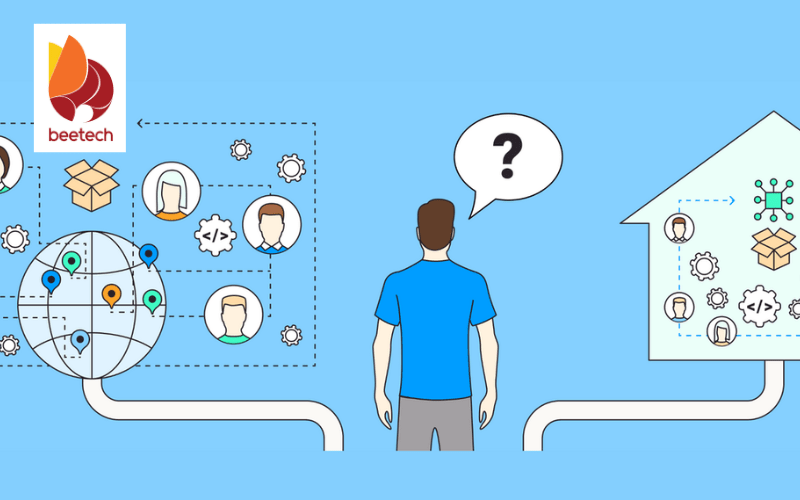Operational models of outsourcing vs. product companies
In the tech industry, companies typically operate under two main models: outsourcing vs. product companies. Outsourcing companies take on projects from clients and develop software based on their requirements, while product companies create and sell their products. Each model has its way of operating, presenting unique opportunities and challenges. This article will help you better understand these two models and their differences.

1. What is an outsourcing company?
1.1. Definition of an outsourcing company
An outsourcing company is a business that provides services or develops products for other companies instead of creating its own. Rather than building an in-house team for every function, businesses can delegate tasks to external service providers, often located in different countries.
>>>Read more:
- 5 criteria needed to evaluate a software outsourcing company in Vietnam
- Top 10 IT outsourcing companies in Vietnam (Update 2025)
This model is widely used in IT, customer support, manufacturing, and digital marketing industries. Outsourcing allows companies to focus on their core strengths while leveraging external expertise to improve efficiency and reduce costs.
1.2. Why do businesses choose outsourcing?
Many companies prefer outsourcing because of its flexibility and cost-effectiveness. Some key benefits include:
Lower Costs: Hiring an external team is often more affordable than maintaining a full-time in-house workforce.
Access to Global Talent: Businesses can work with highly skilled professionals from around the world without geographical limitations.
Scalability: Companies can easily adjust the size of their outsourced team based on project demands.
Faster time to market: With dedicated external teams, businesses can speed up development and delivery processes.
Focus on core business: By outsourcing non-essential tasks, companies can concentrate on strategic growth and innovation.
2. What is a product company?
2.1. Definition of a product company
A product company focuses on developing, owning, and selling its products rather than providing services for other businesses. These companies create software, physical goods, or digital platforms that generate revenue through direct sales, subscriptions, or licensing. Unlike outsourcing firms that work on client projects, product companies invest heavily in research, development, and marketing to build strong brand identity and customer loyalty.

2.2. Why do businesses choose the product model?
Many entrepreneurs and businesses prefer building product companies because of the long-term benefits and control over their offerings. Some key advantages include:
Full ownership & control: Companies have complete authority over product development, pricing, and branding.
Scalability & high-profit potential: A successful product can generate continuous revenue with minimal additional costs.
Brand recognition & customer loyalty: A well-developed product helps build a strong reputation and a loyal customer base.
Long-term value: Unlike outsourcing, where revenue depends on client contracts, a great product can generate revenue for years.
>>> Read more: What are the top Vietnam outsourcing companies?
3. Key differences between outsourcing and product companies
Now, let’s come to the most important part of the article: compare outsourcing vs. product companies. Here is a table to summarize:
| Aspect | Outsourcing companies | Product companies |
| Business model & revenue | Earn revenue by providing services to clients through contracts, hourly rates, or project-based pricing. | Generate revenue by selling products, using models like one-time purchases, subscriptions, or licensing. |
| Investment & risk | Require lower initial investment but depend on acquiring and retaining clients. Risk includes fluctuating demand and competition. | High upfront investment in R&D, marketing, and production. Higher risk but potential for long-term financial rewards. |
| Scalability & growth | Growth depends on hiring more employees or expanding service offerings. Limited by workforce capacity. | Highly scalable, especially for digital products, where a single product can serve millions with minimal extra cost. |
| Control & flexibility | Depend on client requirements, requiring flexibility but often limiting control over project direction. | Have full control over product development, branding, and business strategy. |
| Time to profitability | Can generate revenue quickly after securing clients, but income depends on ongoing projects. | Takes longer to become profitable due to product development and market adoption time. |
| Examples | TCS, Infosys, Accenture, Wipro (IT services); Teleperformance, Concentrix (customer support). | Apple, Microsoft, Google (tech products); Tesla (automotive); Slack, Zoom, Shopify (SaaS). |
4. Outsourcing vs. product companies: Which model fits your business?
Choosing between outsourcing vs. product companies depends on various factors, including your financial resources, risk tolerance, long-term vision, and market opportunities. Each approach has its advantages, so understanding your business goals is crucial in making the right decision.

4.1. When to choose the outsourcing model?
An outsourcing company may be the right fit if:
You have expertise in providing services but lack the capital to develop a product.
You want faster revenue generation without the need for heavy investment in research and development.
You prefer flexibility and are comfortable adjusting services based on client needs.
You thrive in client-based relationships and enjoy working on diverse projects.
Many startups begin as outsourcing firms to generate steady income before transitioning into product development.
4.2. When to choose the product model
A product company may be a better choice if:
You have a strong product idea with clear market demand and growth potential.
You’re willing to invest in R&D, marketing, and branding to build a long-term business.
You want full control over the business model, pricing, and customer experience.
You’re focused on scalability, as successful products can generate passive income with minimal additional costs.
4.3. Hybrid approach: combining both models
Some businesses successfully adopt a hybrid strategy, offering services while gradually developing their products. This approach allows companies to generate revenue through outsourcing while investing in product development.
Ultimately, the choice between outsourcing vs. product companies depends on your business strengths, financial situation, and long-term objectives. Whether you start with outsourcing, product development, or a mix of both, a well-planned strategy will help you scale and succeed in the competitive market.
5. Conclusion
In conclusion, the decision between outsourcing vs. product companies depends on your business’s objectives and resources. Outsourcing provides flexibility, cost savings, and access to global talent, while product companies allow for greater control and long-term growth potential. Understanding these differences is key to selecting the right approach for your business. For more insights and guidance on making the right business model decisions, follow BeetechSoft for expert advice and tailored solutions to help you thrive in today’s competitive market.
